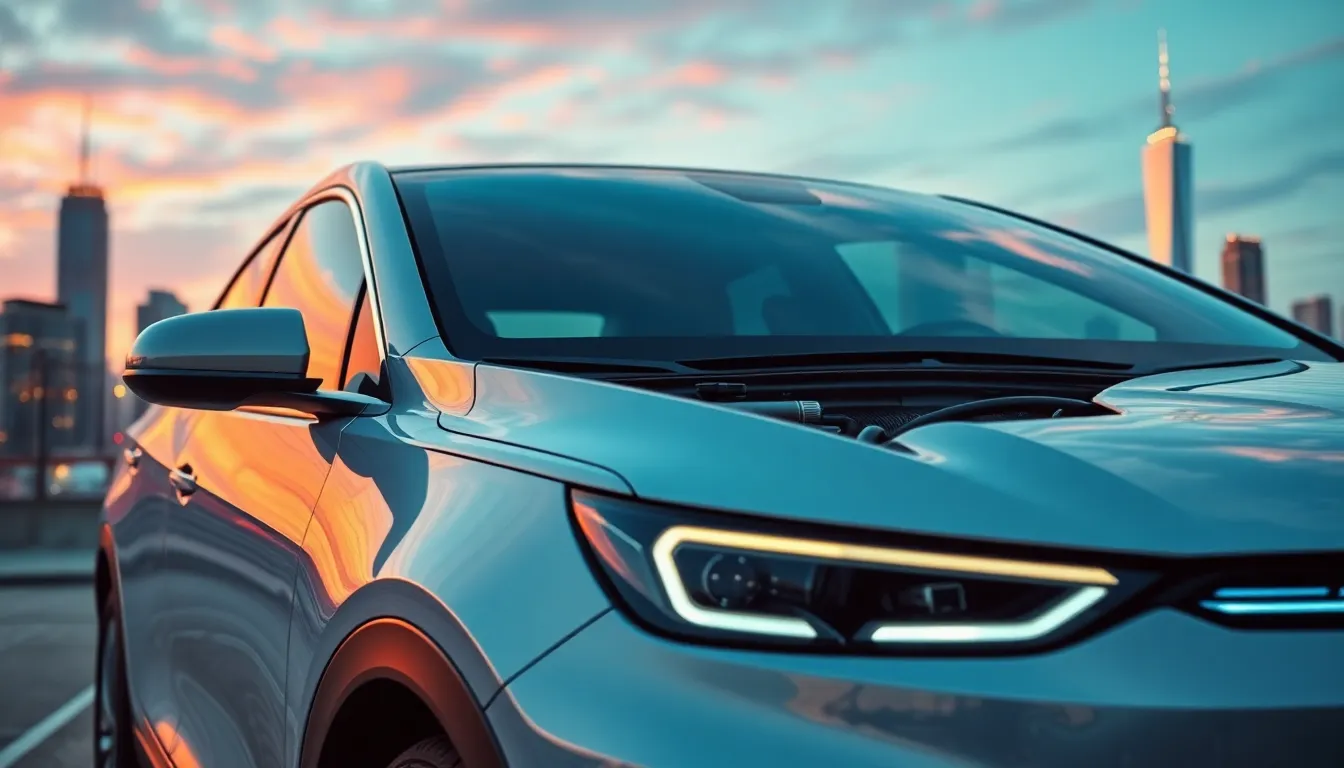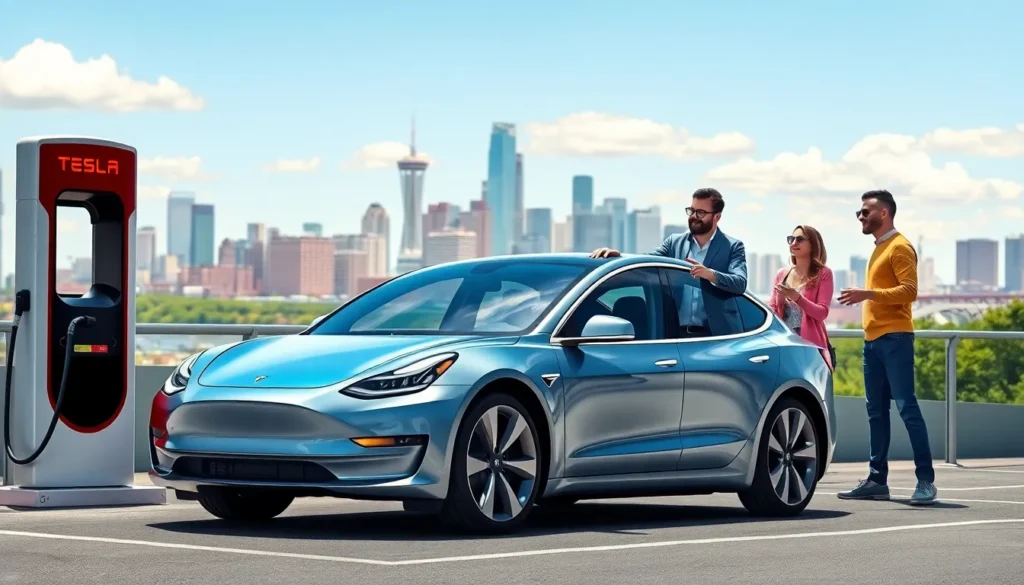In a world where range anxiety feels like a bad sitcom, finding a reliable electric vehicle is like discovering a unicorn in your backyard. With more folks trading gas guzzlers for silent, eco-friendly rides, the demand for dependable electric vehicles has never been higher. But how do you separate the Teslas from the toasters?
Table of Contents
ToggleOverview of Electric Vehicle Reliability
Electric vehicle reliability plays a crucial role in consumer adoption. An electric vehicle’s reliability encompasses factors such as battery performance, mechanical components, and software systems. Research indicates that consumers prioritize reliability alongside environmental benefits when choosing an electric vehicle.
Manufacturers like Tesla, Toyota, and Hyundai focus on robust engineering and testing to enhance reliability. Tesla’s Model 3 consistently ranks high in reliability surveys due to its advanced technology and efficient battery management. Regular software updates improve overall performance, addressing user concerns swiftly.
Toyota’s Prius and RAV4 EV models demonstrate impressive longevity and low maintenance costs. Their reputation stems from years of experience in hybrid technology and electric vehicle engineering.
Key metrics for assessing electric vehicle reliability include:
- Battery Longevity: Lithium-ion batteries in electric vehicles typically maintain performance for 8-15 years, depending on usage.
- Warranty Coverage: Most manufacturers offer warranties of 8 years or 100,000 miles for electric vehicle batteries, ensuring protection against defects.
- Consumer Reports: Reliability ratings from Consumer Reports and J.D. Power provide insights based on consumer feedback and experiences.
Electric vehicle reliability also hinges on charging infrastructure. Access to reliable charging stations, both home and public, alleviates range anxiety and enhances overall confidence in electric vehicle ownership.
Periodic surveys and studies reveal that electric vehicles outpace traditional gas-powered vehicles in most reliability ratings. As technology advances, electric vehicles continue to evolve, showcasing increased durability and performance. This trend leads to greater consumer trust in electric vehicle reliability, encouraging more people to embrace this sustainable mode of transportation.
Factors That Contribute to Reliability

Reliability in electric vehicles (EVs) stems from various essential factors. Understanding these elements helps consumers make informed decisions when selecting a dependable model.
Build Quality
Build quality significantly impacts EV reliability. Manufacturers focus on using high-quality materials and advanced engineering techniques to enhance durability and performance. Comprehensive testing during production ensures components fit precisely and function effectively under varied conditions. A strong build quality leads to fewer mechanical failures and minimizes the need for repairs, contributing to the vehicle’s overall longevity.
Battery Performance
Battery performance is crucial for EV reliability. High-quality batteries provide longer life spans, consistent energy delivery, and efficient charging cycles. Factors like thermal management and battery chemistry influence performance. Reliable models typically feature robust battery management systems that optimize energy usage and ensure safety. Studies show that consumers favor vehicles with extended battery warranties, signaling confidence in their longevity and reliability.
Most Reliable Electric Vehicles in 2023
Electric vehicles (EVs) increasingly meet consumer demand for reliability. Several models stand out for their outstanding performance and consumer satisfaction.
Tesla Model 3
Tesla’s Model 3 consistently ranks high in reliability metrics. It features advanced battery management, which enhances efficiency and longevity. The Model 3 includes a long-range battery that can last over 350 miles on a single charge, reducing range anxiety for drivers. The vehicle’s robust software system regularly receives updates, enhancing performance and safety. Consumer Reports frequently highlights the Model 3 for its low maintenance costs and dependability, establishing it as a top choice among EV enthusiasts.
Hyundai Kona Electric
Hyundai’s Kona Electric showcases reliability combined with practicality. With a range of approximately 258 miles, it meets the needs of daily commuters. The Kona Electric comes equipped with a 10-year or 100,000-mile battery warranty, assuring consumers of its longevity. Its well-engineered build quality promotes durability, minimizing mechanical issues. J.D. Power recognizes the Kona for high customer satisfaction, further validating its reputation as a dependable electric vehicle.
Chevy Bolt EV
Chevrolet’s Bolt EV presents a strong case for reliability in the electric vehicle market. It offers a range of about 259 miles, making it suitable for various driving styles. The Bolt features a spacious interior and user-friendly technology, appealing to families and tech-savvy consumers. Industry reviews consistently praise its dependable battery system and competitive warranty coverage of eight years or 100,000 miles. With low ownership costs and continued software improvements, the Bolt EV remains a competent choice for electric vehicle buyers.
Comparing Reliability Ratings
Reliability ratings provide valuable insights into electric vehicle performance. Organizations like Consumer Reports and J.D. Power assess various metrics influencing these ratings, including battery longevity, warranty coverage, and user satisfaction.
| Manufacturer | Model | Reliability Rating | Battery Warranty |
|---|---|---|---|
| Tesla | Model 3 | 87/100 | 8 years or 100,000 miles |
| Hyundai | Kona Electric | 85/100 | 10 years or 100,000 miles |
| Chevrolet | Bolt EV | 84/100 | 8 years or 100,000 miles |
Tesla’s Model 3 leads the market with its 87 reliability rating. Its advanced battery management and low maintenance costs contribute significantly to this score. Hyundai’s Kona Electric trails closely with a rating of 85, noted for its practicality and 10-year battery warranty, appealing to consumers seeking long-term reliability. Chevrolet’s Bolt EV rounds out the list with an 84 rating, featuring a spacious interior and competitive warranty coverage that enhances consumer confidence.
Factors influencing these ratings include build quality, software systems, and mechanical performance. Electric vehicles generally outperform their gas-powered counterparts in reliability, with studies showing a higher incidence of satisfaction among electric vehicle owners. Extended battery warranties signal confidence in longevity, further boosting their appeal.
Regular evaluations from automotive experts highlight the importance of continuous monitoring of reliability ratings. Consumers benefit from these ratings, equipping them to make informed decisions when selecting their ideal electric vehicle. Reliability remains a paramount factor, establishing trust in this growing segment of eco-friendly transportation.
Future of Reliable Electric Vehicles
Electric vehicles’ future hinges on reliability advancements, driving consumer confidence and market growth. As manufacturers enhance battery technology and software systems, users can expect improved performance across models.
Incorporating artificial intelligence in battery management optimizes energy distribution and extends battery life. This technology reduces risks related to battery degradation, ensuring vehicles maintain their efficiency over longer periods.
Innovations in manufacturing techniques, including automation and precise engineering, are set to improve build quality. These enhancements lead to fewer mechanical failures, reinforcing trust in electric vehicle reliability.
Sustainability remains crucial in shaping electric vehicle designs. Manufacturers focus on using eco-friendly materials and practices, aligning with consumer values. This shift not only attracts environmentally conscious buyers but also supports long-term resource sustainability.
Charging infrastructure development plays a vital role in the reliability equation. Expanding charging networks and introducing fast-charging stations enhance convenience, alleviating range anxiety. Sustainable and accessible charging options increase user confidence, making electric vehicles more appealing.
Consumer feedback drives ongoing improvements, as manufacturers analyze satisfaction ratings and reliability surveys. This data informs future vehicle designs, addressing previously identified weaknesses and enhancing overall performance.
Safety features are also evolving, contributing to reliability. Enhanced software systems and real-time monitoring improve vehicle performance and respond proactively to potential issues, underscoring the commitment to consumer safety and reliability.
By prioritizing these developments, the electric vehicle market can expect increased adoption rates and a stronger trust foundation among potential buyers. As technology progresses, electric vehicles are poised to become synonymous with reliability, reshaping the automotive landscape.
The landscape of electric vehicles is evolving rapidly with reliability at the forefront of consumer concerns. As more drivers seek sustainable options they increasingly recognize the importance of dependable models. Leading manufacturers are responding by enhancing engineering practices and focusing on battery performance.
With standout options like the Tesla Model 3 Hyundai Kona Electric and Chevy Bolt EV consumers now have reliable choices that meet their needs. This growing emphasis on reliability not only boosts consumer confidence but also encourages wider adoption of electric vehicles. The future looks promising as ongoing innovations continue to shape a more trustworthy and sustainable automotive industry.




